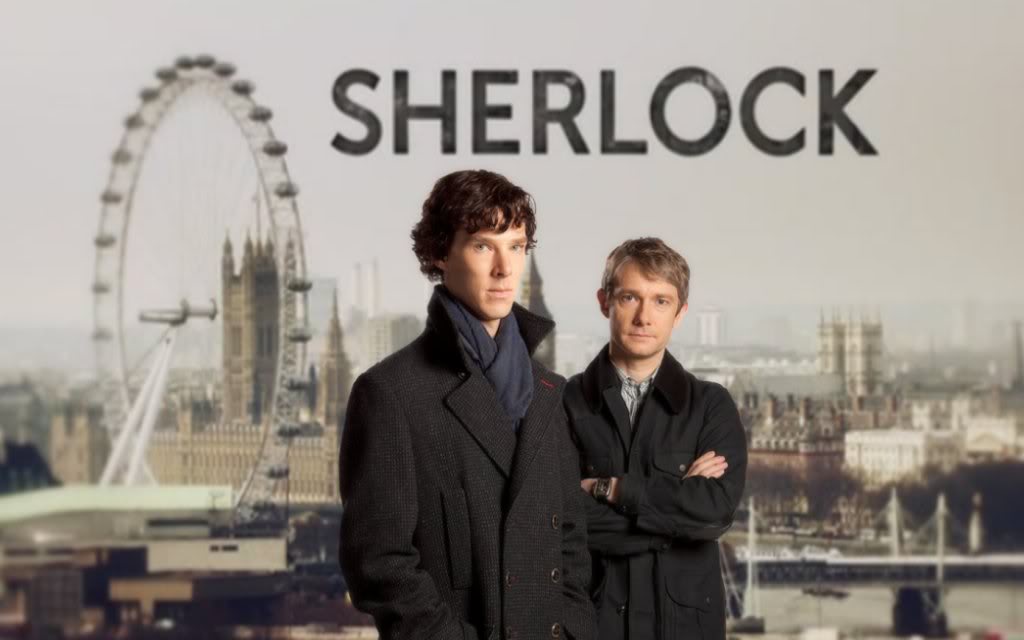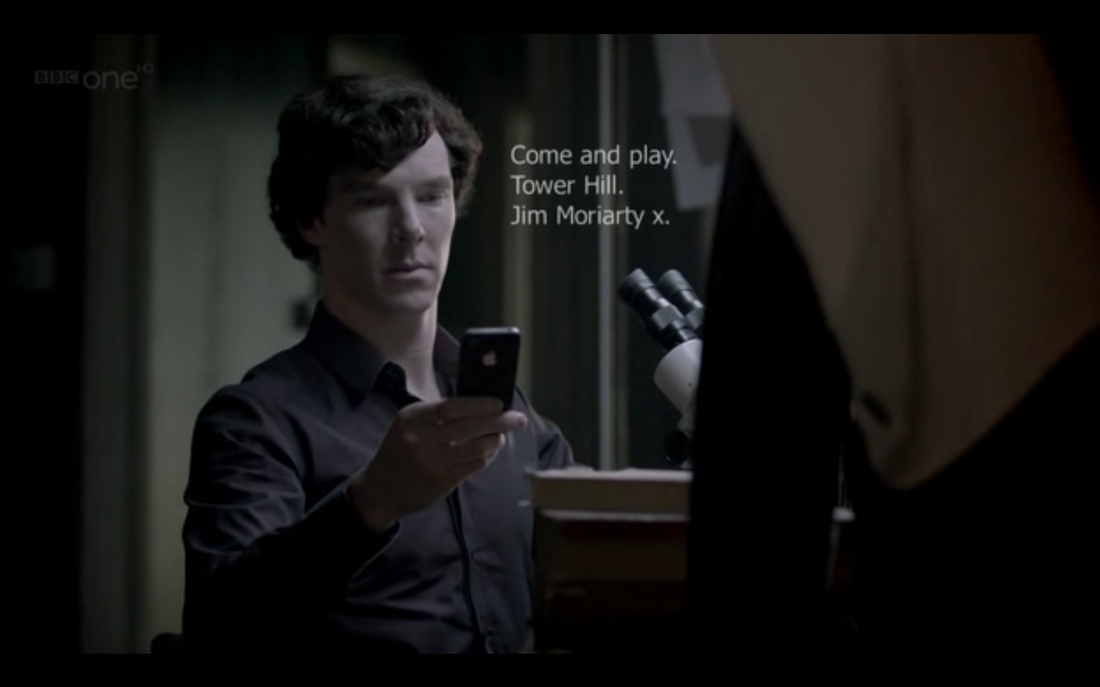
Written by Billy Martel
Over the past several weeks I, and many of my fellow cinemablography contributors, have been spending a lot of time analyzing the remake, and the reboot, especially through the lens of cultural interpretation. We're looking at different versions of the same culture throughout history interpreting the same stories again and again, and trying to find out what each retelling says about the culture that did the telling. A monster in the 1930’s, becomes a hero in the aughts (http://www.cinemablography.org/blog/dracula-as-a-superhero-reviewing-dracula-untold). A goofy protector of children from the 1960's gets reinterpreted as a uncaring force of nature in more modern times (http://www.cinemablography.org/blog/slouching-towards-tokyo-sixty-years-under-the-shadow-of-godzilla). Today I want to discuss one of the most recent interpretations of a classic figure in popular culture that has endured for over a hundred years: Sherlock Holmes.
The greatest, and original, consulting detective in London first appeared in print in 1887, in The Strand magazine, in a serialized novel where he, with his friend and confidant Dr. John Watson, faced off against a gang of evil Mormons. Since then Mr. Holmes has been consulted in hundreds upon hundreds of cases, only a comparatively small number (about 60) of which were written by his original creator, Sir Arthur Conan Doyle. He’s been in novels, short stories, audio dramas, video games, television and, of course, film. He’s inspired countless other detective characters with his particular brand of crime-solving through observation and deduction.
Recently a whole slew of new Holmes related material has sprung up, with a movie franchise, two TV series (one American and one British) and the direct to video market all with their own distinctive versions of the great detective. The public seems to have responded quite favorably to most of these products, causing a wave of Holmes hysteria across the internet. Most of this praise of late however has been directed at one iteration in particular: the BBC’s Sherlock (Gatiss, and Moffatt 2010-present).
The series was created by Mark Gatiss and Steven Moffatt, two Sherlock Holmes fans who met while they were both writing for another BBC show with worldwide success: Doctor Who (Newman, Webber, and Wilson 1963-present). Moffatt had had success adapting and updating the story of Dr. Jekyll and Mr. Hyde for the BBC in his series Jekyll (Moffatt 2007) so the idea of doing the same kind of thing with Sherlock seemed like a good idea. The two worked together to try and create a unique feel for the show that would be in keeping with the original stories but still have enough room to grow, change, and surprise the audience every now and again. Up and coming character actors Benedict Cumberbatch and Martin Freeman were cast in the title roles of Holmes and Watson respectively. Due to the BBC’s mistrust of the series potential for success, the first series (in Britain a “series” is equivalent to an American show's “season”) was only three 90 minute episodes long. This is a trend that has continued throughout the shows run despite its success so that now though we are three series in there are only 9 episodes.
Any adaptation of Sherlock Holmes that remains true to the source material has to be a tightrope walk. You have to balance Holmes’ arrogance with his heroism, and Watson’s ignorance with his usefulness. Holmes has little regard for stupidity and unfortunately also sees the rest of the world as being full of stupid people. Holmes solves crimes because he loves the thrill of it. He needs the mental rush of puzzle solving (which is why he is often depicted as a drug addict, or in this version as a recovering cigarette smoker). But at the same time he puts himself on the side of law and order, he could very easily become the world’s greatest criminal mastermind but he does not. Watson’s job most of the time is to not understand something. Holmes walks into a room and declares, “The butler did it!” Watson’s job is to say, “but Holmes! How could you know that?” And then Holmes will explain. The problem with this is that while Watson is not as smart as Holmes, he is still capable and useful to Holmes; otherwise he wouldn’t keep him around. So Watson can never be portrayed as an idiot.
This show walks these lines by directly calling attention to them. Like most of Moffatt’s writing Sherlock is a meta-commentary on itself. As Sherlock and John travel about solving mysteries and facing off against longtime nemeses like Moriarty or Irene Adler the show also has the characters confront their own natures. Sherlock is constantly confronted with the knowledge that he is not normal. He never regrets this fact, but his overly analytical mind makes it so he can’t communicate or understand normal people the same way John does. Watson is constantly dealing with the way people perceive him as Holmes’ pet, or even his boyfriend. Holmes and Watson’s close friendship has often been a point of speculation as to whether or not the two share a sexual relationship. This series confronts this head on by having the characters grow closer as friends over time while constantly being referred to as a couple by casual observers. Watson loudly and angrily proclaiming, “I’M NOT GAY” has become a running gag at this point. Strangely enough this gag has caused some fans to believe that the characters will end up together. In effect, defeating the purpose of the gag completely.
Modern British characters are very different however from United States ones however. Characters like Superman and Batman were initially created to be somewhat flawless. They were made to be heroes we could look up to and aspire to be. Characters like Sherlock Holmes, or the Doctor from Doctor Who were never intended to be perfect. Sherlock, from Doyle’s very first story, was an insufferable know-it-all, a drug addict, and a generally pretentious git. His appeal has never been in his standing as a role model but in his cleverness. Therefore Moffatt has felt no need to say that Holmes is not the person that we thought he was, all he wants to do is confront Holmes himself with what we all know he is and see how he feels about it.
Beyond that the series is beautiful to look at. The cinematography and editing work together beautifully to give Sherlock’s London a unique, otherworldly feel much like the original stories had. There are also several editing tricks and special effects used to go inside the mind of Holmes and see how he thinks that are stunning the behold (in particular a scene from the end of season 3 where Sherlock is shot and must figure out how to survive the experience). The acting is brilliant in particular Cumberbatch’s performance as Sherlock, which has garnered him celebrity status on an almost disturbing level through a group that refer to themselves as the "Cumber-bitches" or sometimes the "Cumber-collective". The show ended its third series earlier this year, and the next one is currently set to premier sometime in 2016.




 RSS Feed
RSS Feed
